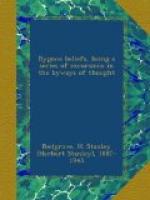impure a pure one, so also Argent-vive coveteth
a Sulphur, as that which should make perfect which
is imperfect: So also a Body freely desireth
a Spirit, whereby it may at length arrive at its perfection."[1b]
At the same time, however, Mercury was regarded as
containing in itself both male and female potencies—it
was the product of male and female, and, thus, the
seed of all the metals. “Nothing in the
World can be generated,” to repeat a quotation
from BERNARD, without these two Substances, to wit
a Male and Female: From whence it appeareth,
that although these two substances are not of one
and the same species, yet one Stone doth thence arise,
and although they appear and are said to be two Substances,
yet in truth it is but one, to wit, Argent-vive.
But of this Argent-vive a certain part is fixed
and digested, Masculine, hot, dry and secretly informing.
But the other, which is the Female, is volatile,
crude, cold, and moyst."[2b] EDWARD KELLY (1555-1595),
who is valuable because he summarises authoritative
opinion, says somewhat the same thing, though in clearer
words: “The active elements . . . these
are water and fire . . . may be called male, while
the passive elements . . . earth and air . . . represent
the female principle.... Only two elements, water
and earth, are visible, and earth is called the hiding-place
of fire, water the abode of air. In these two
elements we have the broad law of limitation which
divides the male from the female. . . . The
first matter of minerals is a kind of viscous water,
mingled with pure and impure earth. . . Of this
viscous water and fusible earth, or sulphur, is composed
that which is called quicksilver, the first matter
of the metals. Metals are nothing but Mercury
digested by different degrees of heat."[1c] There
is one difference, however, between these two writers,
inasmuch as BERNARD says that “the Male and
Female abide together in closed Natures; the Female
truly as it were Earth and Water, the Male as Air and
Fire.” Mercury for him arises from the
two former elements, sulphur from the two latter.[2c]
And the difference is important as showing beyond question
the a priori nature of alchemical reasoning.
The idea at the back of the alchemists’ minds
was undoubtedly that of the ardour of the male in the
act of coition and the alleged, or perhaps I should
say apparent, passivity of the female. Consequently,
sulphur, the fiery principle of combustion, and such
elements as were reckoned to be active, were denominated
“male,” whilst mercury, the principle
acted on by sulphur, and such elements as were reckoned
to be passive, were denominated “female”.
As to the question of origin, I do not think that
the palm can be denied to the mystical as distinguished
from the phallic theory. And in its final form
the doctrine of principles is incapable of a sexual
interpretation. Mystically understood, man is
capable of analysis into two principles—since
“body” may be neglected as unimportant




